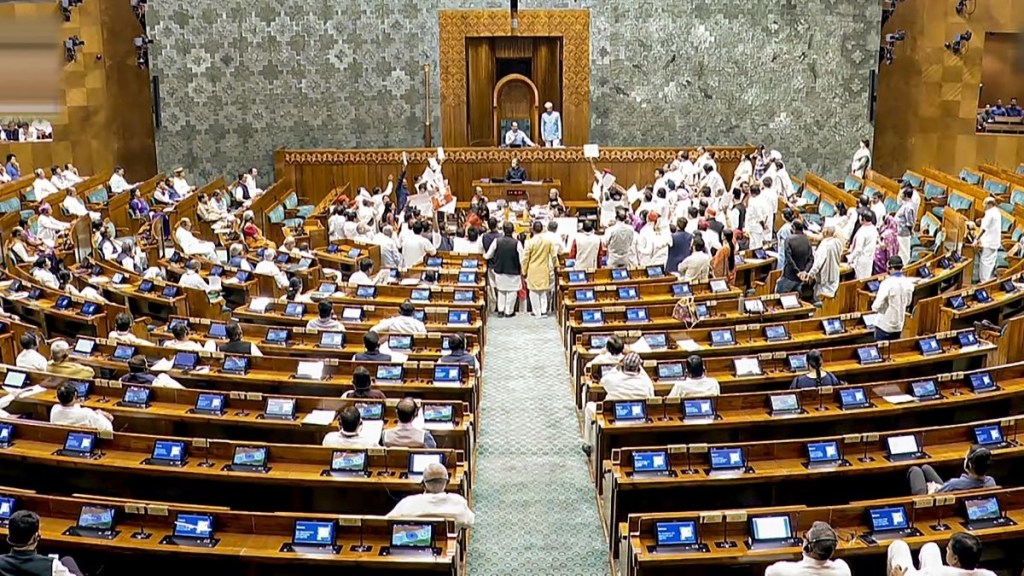The Lok Sabha witnessed a huge chaos on Wednesday, just a day before parliament will be adjourned till the next sitting, after Union Home Minister Amit Shah moved the anti-graft bills to remove Prime Minister, Chief Ministers or Ministers who have been held under serious charges, and are in jail for more than 30 days. Shah introduced the Constitution (One Hundred and Thirtieth Amendment) Bill, 2025, the Constitution of India and the Government of Union Territories (Amendment) Bill, 2025, and the bill to amend the Jammu and Kashmir Reorganisation Act, 2019.
Through the J&K Reorganisation (Amendment) Bill, the Centre intends to amend section 54 of the 2019 Act, to provide a legal framework for the removal of the Chief Minister or a Minister in case of arrest or detention in custody on account of serious criminal charges.
VIDEO | Parliament Monsoon Session: Union Home Minister Amit Shah (@AmitShah) tables the Constitution (130th Amendment) Bill, 2025, the Government of Union Territories (Amendment) Bill, 2025, and the Jammu and Kashmir Reorganisation (Amendment) Bill, 2025 in Lok Sabha.… pic.twitter.com/AB8NBhPj3C
— Press Trust of India (@PTI_News) August 20, 2025
As Shah moved the Bill, the opposition members torn it and threw at side of the treasury benches. A massive ruckus severely hit the proceedings, leading the chair to adjourn the house. But, why is the opposition against the Bill?
Opposition’s 5 key arguments against the bill
1. Only 30-day period for proving innocence
The members of opposition have called the Bill “draconian”, “squarely destructive” that will undermine the “rule of law” in the country. They argue that it would give power to the Centre to misuse the investigating agencies and remove an elected office from power.
For instance, the J&K Reorganisation (Amendment) bill provides that if the advice of the Chief Minister for the removal of a Minister arrested and detained in a case is not tendered to the Lieutenant Governor by the thirty-first day, he shall cease to be a Minister, with effect from the day falling thereafter, reported PTI.
Congress MP Vivek Tankha expressed shock over the window of mere 30 days, adding that the bill is not just. “…I find it a bit strange that they are giving a 30-day window and leaving it to the courts. The court decides who gets relief and who doesn’t, making this indefinite, and I don’t think this is correct…” he added.
2. Violates ‘innocent until proven guilty’ principle
Congress MP Manish Tewari said that mere sacking someone based on allegations changes the principle of “innocent until proven guilty”. “The Indian constitution says there should be rule of law, and the basis of that is that you are innocent until proven guilty. This hopes to change that,” he said.
VIDEO | Delhi: Congress MP Manish Tewari (@ManishTewari) opposes the three bills introduced for removal of PM, CMs, Ministers held on serious criminal charges.
— Press Trust of India (@PTI_News) August 20, 2025
He says, “This Bill throws all existing constitutional safeguards to the winds. This amendment is unnecessary and… pic.twitter.com/3QyL5KeO71
He called the Bill “squarely destructive”, and added it makes an “executive agency officer the boss of the Prime Minister”.
3. Against the ‘principle of separation of power’
Opposing the Bill, AIMIM MP Asaduddin Owaisi said the Bill is in clear violation of the basic structure of federalism and separation of power.
“I stand to oppose the introduction of Jammu and Kashmir Reorganisation (Amendment) Bill 2025, Government of Union Territories (Amendment) Bill 2025 and the Constitution (One Hundred and Thirtieth Amendment) Bill 2025. This violates the principle of separation of powers and undermines the right of the power to elect a Govt,” Owaisi said.
VIDEO | Delhi: AIMIM MP Asaduddin Owaisi (@asadowaisi) opposes the three bills seeking removal of the Prime Minister, Chief Ministers, and Ministers facing serious criminal charges.
— Press Trust of India (@PTI_News) August 20, 2025
He says, “This bill will empower unelected bureaucracy to play the role of the legislature, and… pic.twitter.com/oOrAfe5GKX
4. ‘Executives will become judge’
Owaisi further said the bill would allow the executive agencies to act like judge on allegations that could be false. “It gives executive agencies a free run to become judge and executioner based on flimsy allegations and suspicions…This Govt is hell-bent on creating a Police State…” he added.
AAP opposes bill, recalls leaders’ arrest in “fake cases”
The Aam Aadmi Party (AAP) also opposed the Bill, saying that the step is aimed to “implement a dictatorship”. AAP leader Anurag Dhanda said that Central government has misused agencies to arrest leaders and charge them with fake allegations.
“AAP strongly opposes the bill that the central government will introduce to parliament. This bill is a way to implement a dictatorship. The central government has been misusing agencies against the opposition leaders. Sometimes, they arrested ministers, and sometimes the chief ministers of other parties,” Dhanda said.
5. Fake cases fear
Invoking the examples of arrest of top ex-ministers of Delhi including former CM Arvind Kejriwal, Manish Sisodia and Satyendar Jain, he said they would have been ousted. “They put Satyendar Jain in jail for more than 1.5 years by putting a fake case on him, and a few days ago, they said that they do not have any evidence against him. According to this bill, Satyendar Jain would be ousted from his ministerial post, despite being innocent. Using this bill, they can even bring down the whole government…” he added.
The Lok Sabha has sent the three Bills to the Joint Committee of Parliament, where members of both Houses, including the Opposition, would get an opportunity to give their suggestions.

